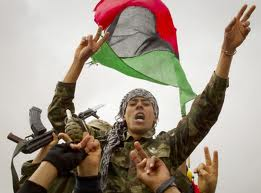Obama did this. Was there any thought to what we were doing in Libya when it became evident back in March that al Qaeda was in and among the “rebel” faction? How is al qaeda preferable to Qaddafi?
We spent billions assisting in the overthrow of Qaddafi, and Libya’s rebel government said Sunday that it will not extradite the Muslim Lockerbie bomber, Abdel Baset al-Megrahi, who was convicted in the 1988 bombing of a U.S.-bound jetliner which killed 270 people (mostly Americans) when it exploded over Lockerbie, Scotland.
Tens of thousands dead, billions spent ………. for what?
The newly “islamicized” Libya freed hundreds of hardcore Jihadists from prison there. Check out the latest from CNN. Noman Benotman is a former Libyan Islamic Fighting Group Member who renounced violence and joined the Quilliam Foundation, a counter-radicalization group based in the UK. According to him:
World Report: Hundreds of Libyan Jihadists Released from Jail The Blaze
“The freed militants had been imprisoned in Tripoli‘s Abu Salim prison by Moammar Gadhafi’s regime during the height of the insurgency in Iraq… as many as 600 militants may have been among the prison population at Abu Salim.”
In an even more distressing admission, Benotman also told CNN that many of the militants released are pro-al Qaeda and could infiltrate and perhaps control elements of the rebel forces, or start their own militant factions. He continued his analysis with this question:
“Nobody knows what these released prisoners are going to do next…will they take part in the fighting and if they do will they join pre-existing rebel brigades or form a separate fighting force?”
Libya has a long been known as a hotbed of the international Jihad. A study by the Combatting Terrorism Center at West Point indicated that a disproportionately large number of young men from Libya entered Iraq to wage Jihad during the height of that conflict.
Beyond that, the CTC study noted that the East of Libya– the area from which the anti-Gadhafi rebels originate– has been the region most associated with Islamic radicalism in the country. On this point, the author, Alison Pargeter, wrote:
“Eastern Libya has traditionally been the primary center of the country’s Islamist opposition currents and where cells of young Islamist militants are located. It is also where scores of young Libyan men left to join the jihad in Iraq. Given that the regime is still struggling for survival and that Libya looks unlikely to return to any sort of normality soon, the issue of Islamism in a future Libyan scenario cannot be dismissed.”
The release of hundreds of prisoners– many of whom apparently have Jihadist backgrounds– should concern anyone who still believes a peaceful, democratic Libya can form.
But as we continue to struggle with the war in Afghanistan– where the official estimate of Al Qaeda members was under 100 in 2009– the possibility that 600 Jihadists have been released in Libya at this critical time could be an urgent matter for the future of that country.


